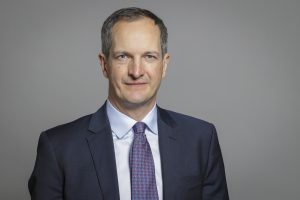Lord Wolfson of Sunningdale, who died recently aged 85, was Downing Street’s first Chief of Staff, and a key adviser in Margaret Thatcher’s inner circle. Here Lord Bethell of Romford, Parliamentary Under Secretary of State at the Department of Health and Social Care, a close friend of the Wolfson family, pays tribute…
Known as the backroom operator behind Margaret Thatcher’s Downing Street operation, it was ironic that Lord Wolfson of Sunningdale – better known just as David Wolfson – had more charisma than most of front-of-house politicians of his generation.
His passing earlier this week reminds us of another time when Britain’s future was on the line – and a radical Conservative Party was dragging the country into a new age.
David Wolfson came from a remarkable business family that had made many fortunes from retail to finance, and would go on to make many more. It had become one of Britain’s great dynasties that had endowed colleges at Oxford and Cambridge, and ran influential philanthropic trusts including the Wolfson Foundation.
As a young man, David also went into retail where he thrived, cutting a dash as the CEO of a fashion brand. An imposing 6’3”, he looked good in a suit and seemed destined for a life in the boardroom, but gave it up in his professional prime for unpaid public service supporting the most radical Prime Minister of our lifetime.
As Charles Moore, Margaret Thatcher’s official biographer, puts it to me: “’David Wolfson was a quietly distinguished contributor to Margaret Thatcher’s political success. One of the few she could wholly rely on, he spotted her qualities early on, and nurtured and supported them. His family’s hospitality also gave her some rare moments of rest. For David, the sort of businessman who takes the long view, Thatcherism was the best investment he made.”
When I first met him in 1973, I was aged just six and he seemed an imposing, self-assured and scary figure. Many people felt that way about him even when they were at the top of their professions.
In 1979, the newly elected Prime Minister surprised everyone when she brought the young retail entrepreneur to be her Chief of Staff. And “Crawfie“ – Cynthia Crawford, who worked as David’s Assistant – became her personal assistant. It was bold move that in the days of “Yes Minister!” the PM would bring someone from outside the Civil Service to sit in the morning meeting and organise access to her time.
His appointment at the heart of the Prime Minister’s team reminds us how Margaret Thatcher rejected orthodoxy – and embraced modernity in building a team at No 10 that were the effective shock-troops of a revolution that transformed the country.
For her inner circle, the Methodist from Grantham did not surround herself with predictable grandees of the Tory party. Instead she chose the sharpest minds of our time. Sir Alfred Sherman and Keith Joseph on the policy side of things; Nigel Lawson and Malcolm Rifkind running key departments in the Cabinet; and David Young and Leon Brittan as champions of enterprise.
The appointment of the unconventional businessman as her Chief of Staff may have surprised the mandarins but it was entirely consistent with her preference for radical intellectuals. It proved to be a successful innovation that has taken a generation to embed itself.
David glowed with intellectual confidence. It meant he could hold his own with the formidable PM when lesser minds turned to blancmange. What she valued was his ability to look through the chaff and identify what really mattered. It was that ability that later helped him as Chairman of Next to turn around a corporate car-crash and build the foundations of a remarkable high street success story. His son Simon, Lord Wolfson of Aspley Guise, now Chief Executive of Next, has inherited his unconventional approach.
With his MBA from Stanford, David was a West Coast technology-lover before Microsoft and Google even existed. I remember on holiday at his house in Cornwall, he spent weeks programming a shiny new Psion organiser, a forerunner of handheld iPhone-style technology. David Howell, a Thatcher Minister and another guest, pressed the wrong button and wiped the memory. The atmosphere at dinner was very tense.
After life at Downing Street, he had a successful business life, at Next, at GUS and with his private investments.
His more recent political impact was as a supporter of Eurosceptic causes, particularly as a patron of campaigns against joining the Euro and, more recently, of Open Europe, now subsumed into Policy Exchange. With Blair in Downing Street and European federalism riding high, these were lonely years for Euroscepticism. It would be fair to say that Britain may not have left the EU without the sponsorship of David Wolfson and his immediate friends during this lean period.

